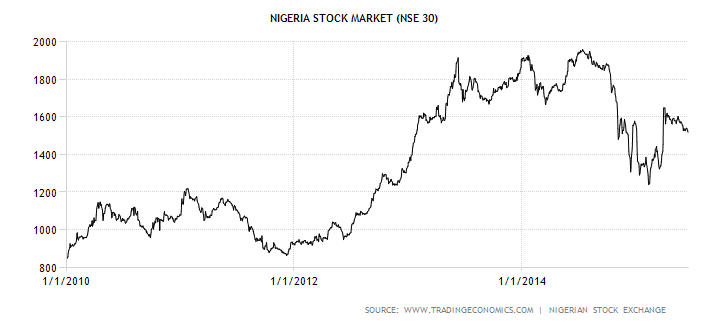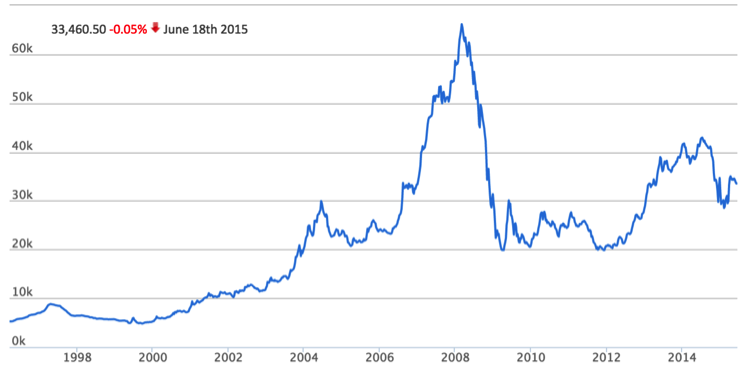People are rightly outraged with the idea that each member of the National Assembly is to receive a ‘wardrobe’ allowance of N9million. This is at a time when most states are not paying all the salaries and pensions that are due to their workers and we are told that austerity measures are necessary. But is the economy really in trouble and if austerity is necessary why does it only apply to us and not to the rich politicians and business people?
The media tells us that falling oil prices mean that we face austerity, but the bosses do not really believe this. What they really think about the economy is shown by the following graph from the Nigerian stock exchange:
This shows that the ‘dividends of democracy’ for the rich are indeed huge and on a rising trend. The average price of shares is now six times higher than it was during presidential elections in 1999. In the last four years alone, there has been an increase of 67% (despite the drop in prices in the second half of last year). This means that if a rich person had invested one million in Naira in 1999 their investments would now be worth over six million Naira! Similarly if they had invested a million naira in 2011 the investment would now be worth Nearly 1.7million.
There have been temporary drops of course, especially in 2008 and from June last year. But these followed fantastic increases in the stock exchange index – 150% in 2006/07 and over 100% from mid-2012 to mid-2014. So the business people are doing very well thank you and the politicians think they deserve the same rewards.
Members of the National Assembly share a budget of N150billion between less than 500 of them. In contrast, the rest of us share a Federal public health budget of only N237billion. As a result, the average age at birth for Nigerians is less than the average for sub-Saharan Africa. In addition, infant mortality is higher, immunisation rates are lower and the proportion of births attended by a trained professional are much lower than the average for sub-Saharan Africa.
Of course these statistics only apply to us – the rich and powerful elite, the company bosses and politicians do not use public hospitals. They fly out to Europe, America or South Africa when they or their families fall ill or need treatment.
One of the reasons that Buhari was elected was that in his manifesto he promised that:
“I will increase national health expenditure per person per annum to about N50,000 (from the less than N10,000 currently).”
In 2012, the World Health Organisation estimated that the minimum spending per person per year needed to provide basic, life-saving services was at least US$44 (N7,000)[i] and that spending of a little over US$60 (N10,000) per person per year by 2015 would be needed to achieve the Millennium Development Goals.
However, recently the Federal Government of Nigeria only planned to spend less than 6% of its annual budget on health or N1,700 per capita[ii]. Even if Buhari kept his election promise to increase health spending, this would only rise to N8,500 or less than the figure the World Health Organisation said was necessary to achieve the Millennium Development Goals this year.
So people are rightly angry that politicians elected to provide change are continuing with the tradition of looting as much money as possible. Austerity is a poor excuse for not paying our salaries and pensions on time – the striking workers in many states are rightly demanding that the state governments pay their debts. Buhari should not be allowed to use austerity as an excuse for not implementing his election promise to increase funding on public health.
We need to ensure the NLC and TUC organise a militant fight, including co-ordinated strikes, against austerity, for the payment of all arrears of salaries and pensions and for an increase in the minimum wage. Austerity is only necessary because of organised looting of our resources by the rich and corrupt elite.
[i] WHO (2012) Spending on health: A global overview
http://www.who.int/mediacentre/factsheets/fs319/en/
Basic WHO statistics on spending in each country:
http://apps.who.int/nha/database/StandardReport.aspx?ID=REPORT_COUNTRY_PROFILE
[ii] Federal Budgets 2013 and 2014.










